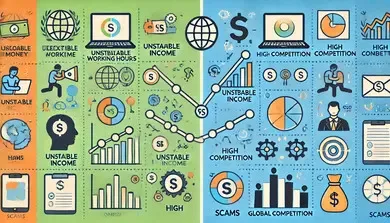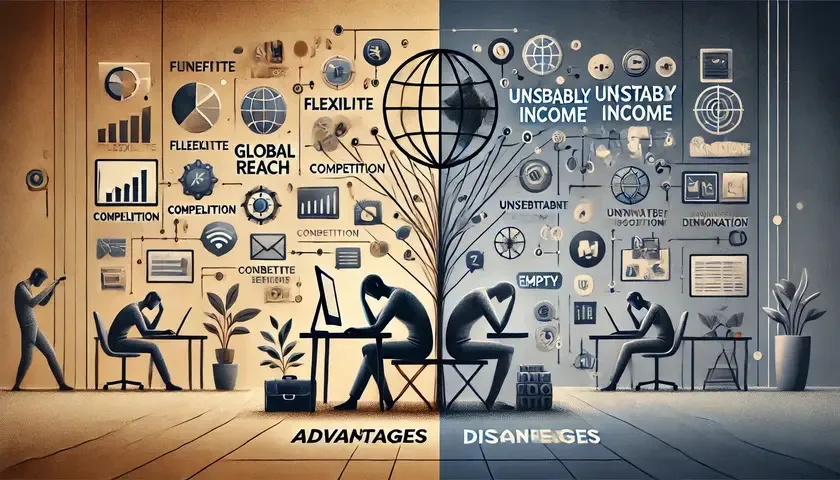
Advantages and Disadvantages of Earning Money on the Internet: A Comparative Analysis
In today’s digital era, the Internet offers an array of opportunities to earn money from the comfort of one’s home. From freelance work and content creation to online trading and affiliate marketing, earning money online has become an attractive option for many. However, like any earning method, it has its pros and cons. This article explores the advantages and disadvantages of making money online, followed by a comparative analysis of online and offline earning opportunities.
Advantages of Earning Money on the Internet
- Flexibility and Convenience
One of the biggest benefits of earning money online is flexibility. You can choose your own working hours, which allows for better work-life balance. Unlike traditional jobs, where you are bound to specific working hours, online opportunities let you work whenever you want. - Low Initial Investment
Starting a business or a freelance career online generally requires minimal investment. Most people can begin earning with just a computer and an Internet connection, avoiding the high upfront costs associated with physical businesses. - Global Reach
The Internet allows you to tap into a global market. Whether you are selling products or services, your potential customer base isn’t limited by geographical boundaries. This opens up numerous opportunities for higher income. - Diverse Opportunities
There are various ways to earn online: freelancing, online tutoring, blogging, content creation, e-commerce, and affiliate marketing, to name a few. This diversity provides individuals with a wide range of income streams, reducing the dependency on a single source of income. - Scalability
Many online earning methods, such as e-commerce and digital product sales, are scalable. Once your online business starts growing, you can expand operations without the need for significant extra resources.
Disadvantages of Earning Money on the Internet
- Unstable Income
While online earning offers flexibility, it is often accompanied by income instability. Freelancers, for instance, might face periods with little to no work, making it challenging to maintain consistent earnings. - High Competition
Since the barriers to entry are relatively low, online earning platforms are flooded with competition. This can make it harder for beginners to break through and succeed in saturated markets, such as freelancing or e-commerce. - Self-Discipline and Time Management
Earning online requires a great deal of self-discipline. With no boss to oversee your work, it’s easy to become distracted and lose focus, leading to reduced productivity. - Lack of Social Interaction
Most online jobs are done in isolation, which can lead to feelings of loneliness or disconnection from colleagues. While online communities can help mitigate this, they often don’t provide the same level of engagement as a physical workspace. - Uncertainty and Scams
The online space is rife with scams. Many people fall prey to fraudulent schemes that promise quick riches but end up costing them money instead. Vetting legitimate opportunities can take time and effort.

Comparative Analysis of Earning Money Online and Offline
When comparing online earning to traditional offline jobs, it’s essential to weigh the trade-offs between flexibility and stability. Online work provides greater freedom in terms of time and location, making it ideal for those seeking a better work-life balance or those unable to work in a physical office. However, the income variability and the risk of encountering scams are significant drawbacks.
Offline earning, on the other hand, tends to offer more stability. Regular salaries, social benefits, and a structured work environment are appealing for individuals who value consistency and routine. But traditional jobs can be limiting in terms of growth potential and the ability to scale income. Moreover, commuting and fixed working hours can reduce personal time.
Earning money online presents several advantages, particularly flexibility, lower entry costs, and access to a global market. However, these benefits are counterbalanced by the challenges of income instability, competition, and potential scams. By carefully considering the pros and cons, individuals can make informed decisions about whether online or offline earning suits their lifestyle and financial goals best.
This comparative analysis highlights that neither option is inherently better than the other; it all depends on one’s personal preferences, skill set, and long-term objectives.
